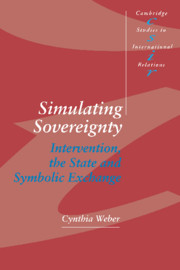Book contents
- Frontmatter
- Contents
- Preface
- Acknowledgments
- 1 Writing the state
- 2 Examining the sovereignty/intervention boundary
- 3 Interpretive approaches
- 4 Concert of Europe interventions in Spain and Naples
- 5 Wilson Administration actions in the Mexican and Bolshevik revolutions
- 6 United States invasions of Grenada and Panama
- 7 Symbolic exchange and the state
- Notes
- References
- Index
- Titles in the series
5 - Wilson Administration actions in the Mexican and Bolshevik revolutions
Published online by Cambridge University Press: 30 September 2009
- Frontmatter
- Contents
- Preface
- Acknowledgments
- 1 Writing the state
- 2 Examining the sovereignty/intervention boundary
- 3 Interpretive approaches
- 4 Concert of Europe interventions in Spain and Naples
- 5 Wilson Administration actions in the Mexican and Bolshevik revolutions
- 6 United States invasions of Grenada and Panama
- 7 Symbolic exchange and the state
- Notes
- References
- Index
- Titles in the series
Summary
… the people cannot decide until somebody decides who are the people.
Sir Ivor JenningsWhile in the early 1800s the Concert of Europe mobilized its influences to counter the tide of liberalism, by the early 1900s President Woodrow Wilson championed the cause of liberalism as the basis for legitimate government everywhere. Wilson dedicated his administration to making the world safe for democracy (and capitalism), and the principle which would enable liberal-capitalist, democratic governments to flourish around the world was self-determination. The people, Wilson held, must select for themselves their own form of governance, and, accordingly, other peoples must respect this process.
This shift from monarchical sovereignty to popular sovereignty provided a new answer to the question, “who is represented?” The political representation of popular sovereignty (sign) required that the people (signified) be represented as the foundation of a state's sovereign authority. A popularly elected government (signifier) would represent the people. While clarifying issues of political representation, the symbolic representation of the people was far from resolved. Left unanswered were the questions: who are the people and who can represent them politically?
When the Wilson Administration looked abroad with hopes of universalizing the sign of representative government based on popular sovereignty and self-determination, it encountered innumerable obstacles, the most disturbing yet most promising of which was revolution. During times of revolution, no clear domestic community or citizenry could be identified, for the citizenry was divided over the very issues that must be settled in order for the principles of popular sovereignty to find practical political expression. In Mexico and the newly forming Soviet Union, distinct political factions claimed to be the legitimate political representatives of their respective peoples.
- Type
- Chapter
- Information
- Simulating SovereigntyIntervention, the State and Symbolic Exchange, pp. 61 - 91Publisher: Cambridge University PressPrint publication year: 1994



